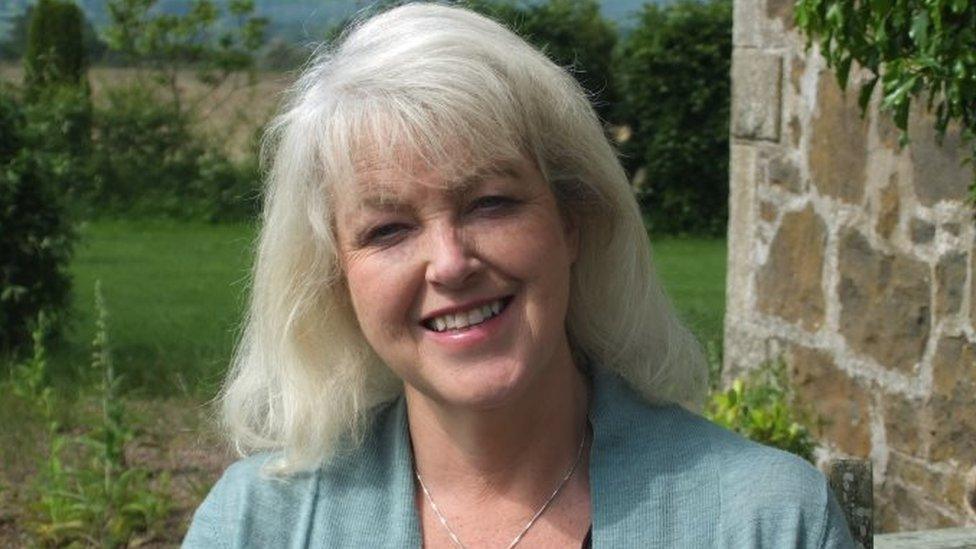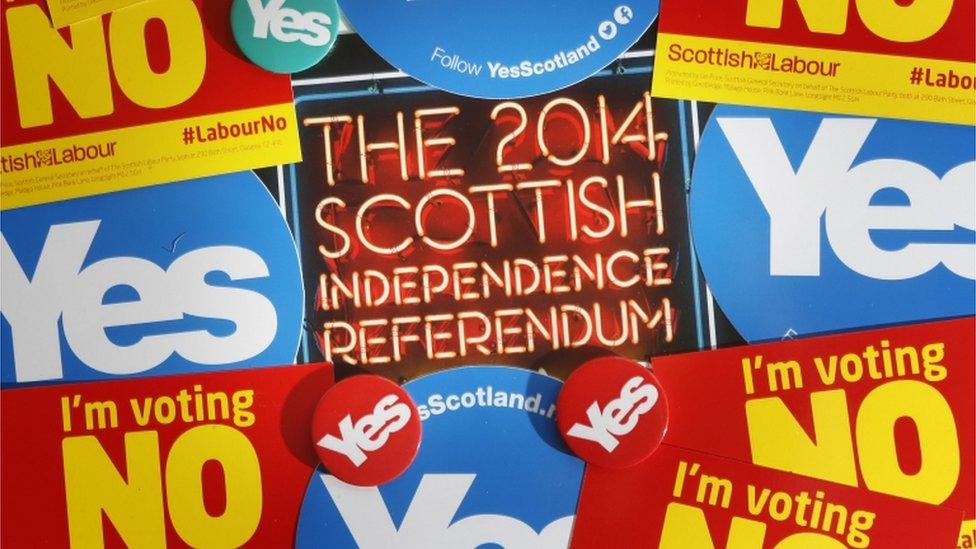Lesley Riddoch hails independence referendum 'involvement'
- Published

Scotland's independence referendum led to greater levels of engagement with those who had never been involved in politics and campaigning before, according to journalist and broadcaster Lesley Riddoch.
BBC Scotland has been talking to her as part of a series of radio interviews with key figures from last year's campaign.

It is only a year ago and many still hold vivid memories of the referendum campaign. But what was it like to be involved from the inside?
We wanted to talk to some of the participants before recollections of the details begin to fade, as inevitably they will. We also wanted to know what perspective some of those involved have on the referendum and its meaning- and whether they see it differently twelve months on. And, at least in the first of our interviews, some may find the answers surprising.
The criterion for choosing the interviewees was simple. Obviously, a balance between the "Yes" and "No" sides of the debate. But we didn't look simply to re-run the arguments.
Do they see the campaign in the same way now as they did a year ago? What would they have done differently? And how is the legacy of the referendum showing up now, not just in Scotland, but across the UK?
Lesley Riddoch is interesting for many reasons. She was an important advocate of getting people involved in the "Yes" campaign who had, perhaps, not been involved in campaigning before, or indeed in politics of any description.
She told us how that effort to involve new people went beyond her wildest expectations.
"I think, really, the thing sort of took off to be honest when George Osborne did his 'You cannae have the pound thing'," she recalled.

The Scottish independence referendum result was 55% against and 45% for
"I was off to see an osteopath in Dundee and he was a very fervent 'No' voter. And when I came in he said 'Well, that's it all over now' and I assumed he meant that there would be a collapse of confidence in the 'No' side. I said 'Really, do you think people are that easily fooled?' and he said 'No, no no, that's it won for the Yes side, you don't tell Scots what to do'. And he's English."
In the interview, the journalist also explained why she believes that, in the light of the SNP's showing in this year's general election and the formation of the left wing group RISE, involvement has not gone away.
"Britain is incapable of reforming itself," she said.
"And the stronger we get a push from all sorts of directions to say the House of Lords is just an embarrassment, the levels of inequality are intolerable, the idea that the people in the Department of Work and Pensions are being issued with suicide guidelines - they sanction stuff that comes out every day - I'm ashamed to be living under this kind of regime.
"I have no confidence that the Establishment is up for change any time soon and leaves one course, which is independence."
'Serious doubts'
But she also tackled some of the harder questions for those with her point of view. Were "Yes" campaigners kidding themselves they were winning over the public while really just talking to themselves?
If getting people involved is the main thing, then isn't Jeremy Corbyn's campaign for the Labour leadership just as important as the "Yes" campaign?
And do any of the issues which really engage her - devolution of power to local communities, land reform, empowering women - really have much if anything to do with independence?
So is independence absolutely necessary to achieve all that, especially if those aims are achieved in some other way by the likes of Jeremy Corbyn or even RISE?
Not necessarily, said Lesley: "I'm a great believer in democracy in that way and if people are engaged and thinking through stuff I'm quite happy to see what the majority's verdict is.
"But here's the thing: I have very serious doubts … I doubt if Jeremy Corbyn would become Prime Minister; I'm not sure quite what support he'll receive in Scotland; I'm not sure he'll take the whole of the Labour Party with him … I'm not sure where that will leave us."
Among the other interviewees will be Johann Lamont, the leader of Scottish Labour during the referendum campaign. She resigned as leader shortly after the campaign ended and was critical of the way her party was run.
I will also be talking to Blair Jenkins, who ran the official "Yes" campaign. I use the word 'official' deliberately, as one of the claims Lesley Riddoch makes is that the "Yes" campaign on the ground only really started when people realised the official campaign was not doing much. Among other things, I'll be asking Blair Jenkins what he makes of that.
The full interview with Lesley Riddoch was broadcast on Sunday on BBC Radio Scotland's Good Morning Scotland programme and is available on the BBC iplayer.